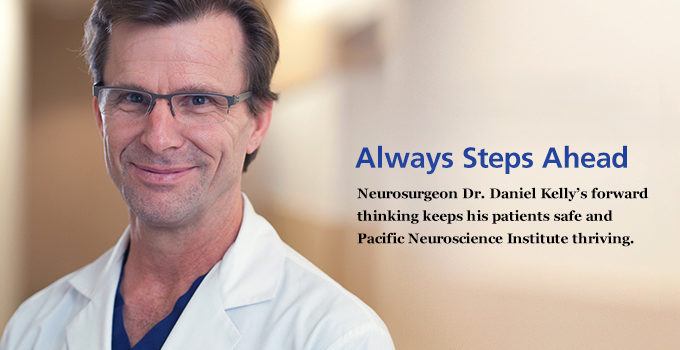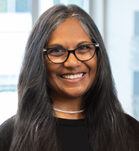

Professional Spotlight | Dr. Daniel Kelly
by Zara Jethani
In the field of neurosurgery, Daniel F. Kelly, MD, is loved by his patients and esteemed by his colleagues. Soft spoken and eloquent, he has a quiet confidence that underscores this highly skilled neurosurgeon’s drive, determination and focus in always pushing the boundaries of excellence. Dr. Kelly is known worldwide for his work in minimally invasive surgical techniques predominantly for the treatment of brain, skull base and pituitary tumors. He is director and founder of Pacific Neuroscience Institute and Professor of Neurosurgery at Saint John’s Cancer Institute at Providence Saint John’s Health Center.
We sat down to talk with Dr. Kelly about his profession and Pacific Neuroscience Institute (PNI). Evidently, he is passionate about his work and we suspect he has a broad rebellious streak.
Before we really do a deep dive into PNI and your role, we know you have some very exciting news about a new program. Would you like to give us a sneak peek?
DK: Sure. As you may now, there’s a lot of suffering and anguish going on out there, now more so than in a long time. But even pre-covid, rates of depression, anxiety, addiction and PTSD were very high.
So over the last 2 years, PNI has been quietly building a new program within our Brain Health Center called TRIP – Treatment & Research in Psychedelics. This effort is focused on the application of psychedelic-assisted therapies with compounds such as psilocybin (magic mushrooms), MDMA (ecstasy) and ketamine to achieve altered states of consciousness and ultimately to change behavior, improve brain health and quality of life.
The renaissance in psychedelics has been going on steadily now for almost 2 decades, and at PNI we plan to be a big part of this effort. The initial data from patients treated with psilocybin or MDMA in small clinical trials with depression, terminal cancer, nicotine addiction and PTSD are extremely promising with success rates that appear to far exceed current therapies.
Our goal is to be part of that effort to gain FDA-approval for these therapies. We are fortunate to have Dr. Keith Heinzerling who is an addiction medicine specialist leading our TRIP Program. We have now opened our TRIP Suite at 1301 20th Street and Dr. Heinzerling will begin offering ketamine psychedelic-assisted therapy in June, and we plan to launch our first clinical trial with psilocybin in the Fall of 2020. So stay tuned…very exciting times.
That’s fantastic. PNI seems to be a great place for this program. There’s a context for how it fits in with all your other offerings. Tell us a bit about what else is available at PNI.
DK: PNI is a multispecialty neuroscience group that is focused on specific areas, what we call Centers of Excellence, with experts for each Center. We now have over 30 MDs working across 9 clinical centers focused on brain health, brain tumors, pituitary disorders, hydrocephalus, movement disorders, stroke and neurovascular disease, facial pain, spine, and finally the eye, ear, and skull base center.
So, it’s very focused; it’s multidisciplinary and very collaborative, and we can see a wide range of patients with all kinds of neurological disorders and conditions. We have also just started a program in Multiple Sclerosis by recruiting a world-class neurologist and expert in autoimmune disease Dr. Barbara Giesser.
You were already a well-established practicing neurosurgeon. What made you want to start PNI?
DK: I have a great group of colleagues in Dr. Griffiths, Dr. Krauss and Dr. Kesari, my junior partner, Dr. Barkhoudarian, and others, and we have been gradually building this up. We had been a center and somewhat of an institute already but were dispersed. We wanted to bring it all under one roof, expand our areas of expertise and make it more concentrated, more cohesive, and most importantly more patient-centric. Frankly, it’s been a natural evolution of amazing great collaboration with outstanding colleagues that has spurred us on to create a better model of neuroscience care and innovation.
It feels like it’s been an organic evolution, albeit with significant effort and drive behind it. Was there any personal connection to the work you do as a neurosurgeon?
DK: My father died of cancer when I was 8, and I know that had some bearing on my desire to become a physician. When I was in high school, I fell in love with biology and when I was in college at Claremont-Mckenna College even more so.
Human evolution and marine biology really excited me but I knew that marine biology was a narrowly focused field for which I would have to get a PhD. So instead by pursuing med school, it essentially allowed me to expand my options and postpone a decision to really figure out what I was most excited about.
I got even more interested in the neurosciences, and really liked neurology and neuroanatomy but preferred the hands-on and immediate gratification of surgery. So neurosurgery was the perfect fit.
My work and passion now in neurosurgery is in minimally invasive removal of all types of brain tumors, including malignant and benign tumors, skull base tumors and pituitary tumors. My other fascination is with the pituitary gland and hormonal health which was ignited by my mentor Dr. Edward Laws who is an amazing force of nature and academic neurosurgeon. As the pituitary gland is indeed the master gland and at the anatomical and functional crossroads of the brain and body, it warrants the upmost respect and care. So being able to operate on it, teach and train fellows and students about it, and write about our surgical experience with pituitary and related tumors, that to me is an important contribution.
That’s a great explanation of why you do what you do. But you obviously deal with some pretty heavy-duty diagnoses. How do you approach patients when they get such news?
DK: I spend a lot of time with my patients. Getting diagnosed with a brain tumor or a skull base tumor is a life-changing event. Sometimes these are very bad tumors, many of them are malignant, fortunately, many are benign, so talking the patient and their family through that educational process and letting them know what to expect, and what the outcomes look like, are really a critical part of what we do.
You have to give them a certain level of comfort and confidence that you can take care of them in the best way possible. We try to assure them that our long experience and expertise in performing minimally invasive keyhole surgery makes it highly likely they will have the best possible outcome and that if they need additional treatment like immunotherapy, chemotherapy or focused radiation, we have a team of experts who will be with them every step along the way.
PNI is affiliated with Providence Saint John’s Health Center and Saint John’s Cancer Institute. What does that partnership bring?
DK: I came from formal academics – UCLA for 14 years – and had an excellent run there since my training, but I was looking for something different, something new, a little more independent, a little more autonomy, and I didn’t want to leave Los Angeles, and Saint John’s was there. And a big part of the reason I came to Saint John’s is because of the Saint John’s Cancer Institute which allowed me to continue my academic pursuits as well as create a fellowship training program for young neurosurgeons.
So, it was really a perfect fit, at an optimal time, and we have been quite successful, and our patients are very grateful for this collaboration. I’ve been at Saint John’s and the Saint John’s Cancer Institute now for over 12 years. PNI would not have happened without John Wayne… we essentially “budded off” of JWCI to expand beyond brain tumors to encompass all the things we now do in the neurosciences at PNI. So PNI and JWCI are joined at the hip. It’s a unique and ever-evolving relationship.
Neurosurgery is no walk in the park, and neither should it be. Mentorship can be a key component to a young neurosurgeon’s success and in shaping the next generation of neuro-specialists.
DK: In doing what we do every day, and the way we treat patients, we lead by example. We spend a lot of time with patients; their outcomes and well-being will always be our top priority.
A big part of what we do is education including our fellowship training program both for clinical (hands-on) fellows and international fellows who come from all over the world (such as Fudan University in Shanghai). We also have many college and graduate students spending time with us including those from Pomona College as part of a neuroscience internship program.
Additionally, the symposia that we do, the courses and meetings our faculty attend all over the world, and our many publications of our clinical outcomes and surgical techniques, are ways we continue to shape and impact the field. When we discuss our outcomes, the way we try to avoid complications, the “pearls and the pitfalls” of complex minimally invasive brain tumor surgery, we are hopefully contributing to better outcomes and quality of life for patients around the globe.
You’re a leader in the field of neurosurgery, and also a thought leader in the neurosciences in general. What do you think the next 10 to 20 years look like?
DK: In neurosurgery, I think keyhole surgery along with targeted medical therapies and focused radiation when needed will become more widely used around the world. Yet when we go around the country and around the world, or we see patients coming in for second opinions, it’s clear that the minimally invasive keyhole surgery we use every day at PNI is not widely practiced. The dissemination of these techniques will take time, but we are endeavoring to be part of that transformation in practice to make surgery as minimally invasive as possible and minimize collateral damage.
Elsewhere in the Neurosciences, I’m most optimistic and excited about the renaissance in psychedelic-assisted therapies. I and many others predict these compounds will profoundly transform behavioral health care for the better. The current “standard of care” for depression, anxiety, addiction and PTSD is woefully inadequate. These therapies which were part of mainstream psychiatry in the 1950-60s are fortunately making a needed comeback. As long as these clinical trials are performed safely and with careful patient selection, the coming decade could be one of the most impactful times in the neurosciences.
Finally, we are also embarking on a hugely important mission to improve care of patients with Alzheimer’s dementia and related cognitive and memory problems. Our Brain Health Center is really at the forefront of finding new ways to extend quality of mind and life, and to age gracefully. And we have a big announcement coming soon about that endeavor… Stay tuned!
Thank you for your awesome insights. We’re looking forward to seeing Pacific Neuroscience Institute continue to grow and thrive over the coming years.
For more information contact Dr. Kelly’s clinic at 310-582-7450, or schedule a virtual or clinic visit.
About the Author

Zara Jethani
Zara is the marketing director at Pacific Neuroscience Institute. Her background is in molecular genetics research and healthcare marketing. In addition, she is a graphic designer with more than 20 years experience in the healthcare, education and entertainment industries.
Last updated: September 16th, 2020